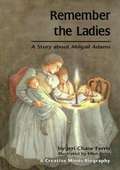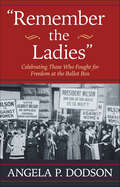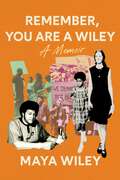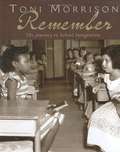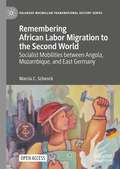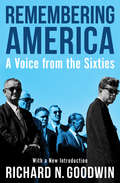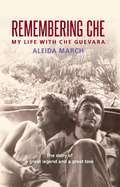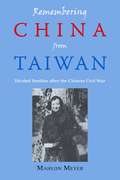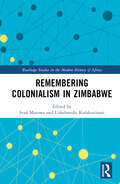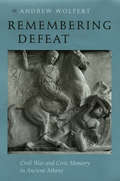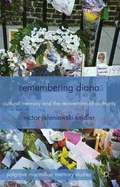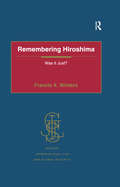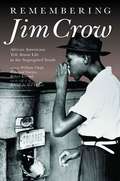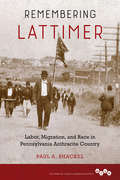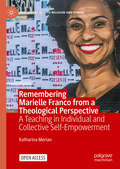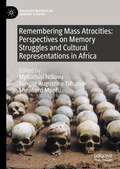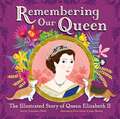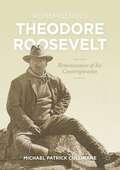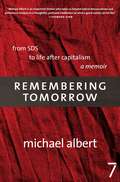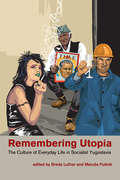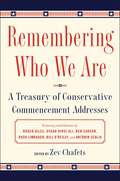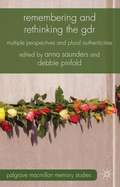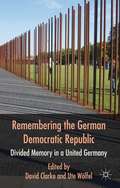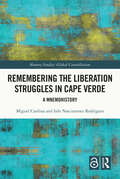- Table View
- List View
Remember the Ladies: A Story about Abigail Adams
by Jeri Chase FerrisChronicles the life and achievements of the nation's second First Lady and advocate for women's rights.
Remember the Ladies: Celebrating Those Who Fought for Freedom at the Ballot Box
by Angela P. DodsonFollowing the centennial celebrations of women first winning the right to vote, this book documents the milestones in the hard-won struggle and reflects on women's impact on politics since. From the birth of our nation to the recent crushing defeat of the first female presidential candidate, this book highlights women's impact on United States politics and government. It documents the fight for women's right to vote, drawing on historic research, biographies of leaders, and such original sources as photos, line art, charts, graphs, documents, posters, ads, and buttons. It presents this often-forgotten struggle in an accessible, conversational, relevant manner for a wide audience. Here are the groundbreaking convention records, speeches, newspaper accounts, letters, photos, and drawings of those who fought for women's right to vote, all in their own words, arranged to convey the inherent historical drama. The accessible almanac style allows this entertaining history speak for itself. It is full of little-known facts. For instance: When the Constitutional Convention of the thirteen colonies convened to draft the Constitution, Abigail Adams admonished her husband John Adams to "remember the ladies" (write rights for women into the Constitution!). Important for today's discussions, Remember the Ladies does not extract women's suffrage from the inseparable concurrent historic endeavors for emancipation, immigration, and temperance. Its robust research documents the intersectionality of women's struggle for the vote in its true context with other progressive efforts.
Remember, You Are a Wiley
by Maya WileyA moving, politically-charged memoir of surviving trauma and embracing the power of activism from MSNBC legal analyst, professor, civil rights lawyer and former New York City Mayoral candidate Maya Wiley. Born in a country that has repeatedly traumatized her and her loved ones, Maya Wiley grew up in a household that prioritized activism, hope, and resilience above all else. This attitude landed her father on President Nixon&’s enemies list as her mother organized third-party political platforms. Still, they modeled hope for their children. In the decades since, she has borne witness as presidents and political figures used racism and fascism to gain power, and as cities have again and again elected white men, effectively shutting out people of color and women from having a political voice. As a result, she has been forced, time after time, to confront death, injustice, and indifference—just as her Civil Rights activist parents did before her. After a mayoral race that further exposed our country&’s deep divisions, Maya is ready to share her story and that of her parents: one of passion, possibility, and compassion in the face of fear and injustice. She takes readers through her unconventional upbringing, her father George Wiley&‘s tragic death and the resulting trauma, as well as how her experiences spoke to racial, gender, and class identity. Against this painful backdrop, Maya charts her journey of coming into herself and finding hope in a dire political landscape. She also digs into how her previous struggles informed her platform, driving her to represent those who have similarly felt voiceless or ignored. In facing and sharing her own past, Maya shows readers how they too can remain optimistic in the face of adversity.
Remember: The Journey to School Integration
by Toni MorrisonToni Morrison has collected a treasure chest of archival photographs that depict the historical events surrounding school desegregation. These unforgettable images serve as the inspiration for Ms. Morrison's text, a fictional account of the dialogue and emotions of the children who lived during the era of separate but equal schooling. Remember is a unique pictorial and narrative journey that introduces children to a watershed period in American history and its relevance to us today. Remember will be published on the 50th anniversary of the groundbreaking Brown v. Board of Education Supreme Court decision ending legal school segregation, handed down on May 17, 1954.<P><P>Winner of the Coretta Scott King Medal
Remembering 1916
by Richard S. Grayson Grayson, Richard S. and McGarry, Fearghal Fearghal McgarryThe year 1916 witnessed two events that would profoundly shape both politics and commemoration in Ireland over the course of the following century. Although the Easter Rising and the Battle of the Somme were important historical events in their own right, their significance also lay in how they came to be understood as iconic moments in the emergence of Northern Ireland and the Irish Republic. Adopting an interdisciplinary approach drawing on history, politics, anthropology and cultural studies, this volume explores how the memory of these two foundational events has been constructed, mythologised and revised over the course of the past century. The aim is not merely to understand how the Rising and the Somme came to exert a central place in how the past is viewed in Ireland, but to explore wider questions about the relationship between history, commemoration and memory.
Remembering African Labor Migration to the Second World: Socialist Mobilities between Angola, Mozambique, and East Germany (Palgrave Macmillan Transnational History Series)
by Marcia C. SchenckThis open access book is about Mozambicans and Angolans who migrated in state-sponsored schemes to East Germany in the late 1970s and throughout the 1980s. They went to work and to be trained as a vanguard labor force for the intended African industrial revolutions. While they were there, they contributed their labor power to the East German economy. This book draws on more than 260 life history interviews and uncovers complex and contradictory experiences and transnational encounters. What emerges is a series of dualities that exist side by side in the memories of the former migrants: the state and the individual, work and consumption, integration and exclusion, loss and gain, and the past in the past and the past in the present and future. By uncovering these dualities, the book explores the lives of African migrants moving between the Third and Second worlds. Devoted to the memories of worker-trainees, this transnational study comes at a time when historians are uncovering the many varied, complicated, and important connections within the global socialist world.
Remembering America: A Voice from the Sixties
by Richard N. GoodwinFrom the speechwriter and top adviser to presidents Kennedy and Johnson: A behind-the-scenes history of the most momentous decade in American politics. Richard N. Goodwin entered public service in 1958 as a law clerk for Supreme Court Associate Justice Felix Frankfurter. He left politics ten years later in the aftermath of Senator Robert F. Kennedy&’s assassination. Over the course of one extraordinary decade, Goodwin orchestrated some of the noblest achievements in the history of the US government and bore witness to two of its greatest tragedies. His eloquent and inspirational memoir is one of the most captivating chronicles of those turbulent years ever published. From the Twenty-One quiz-show scandal to the heady days of John F. Kennedy&’s presidential campaign to President Lyndon Johnson&’s heroic vote wrangling on behalf of civil rights legislation, Remembering America brings to life the most fascinating figures and events of the era. As a member of the Kennedy administration, Goodwin charted a new course for US relations with Latin America and met in secret with Che Guevara in Uruguay. He wrote Johnson&’s historic civil rights speech, &“We Shall Overcome,&” in support of the Voting Rights Act of 1965 and formulated the concept of the Great Society and its programs, which sought to eradicate poverty and racial injustice. After breaking with Johnson over the president&’s commitment to the Vietnam War, Goodwin played a pivotal role in bringing antiwar candidate Eugene McCarthy to within a few hundred votes of victory in the 1968 New Hampshire primary. Three months later, he was with his good friend Robert F. Kennedy in Los Angeles the night that the young senator&’s life—and the progressive movement that had rapidly brought about such significant change—came to a devastating end. Throughout this critical decade, Goodwin held steadfast to the passions and principles that had first led him to public service. Remembering America is a thrilling account of the breathtaking victories and heartbreaking disappointments of the 1960s, and a rousing call to action for readers committed to justice today.
Remembering Che
by Aleida MarchFor the first time, Aleida March evokes the memories of her partner, Ernesto Che Guevara. She describes their great romance and life together from the days when they first met as fellow guerrillas in Cuba's revolutionary war up to the tragic moment when she learned of Che's assassination in Bolivia less than a decade later. As Che's widow, Aleida writes with passion and poignancy of their shared political dreams for the future and their family. Never before have readers been offered such an intimate insight into the man behind one of the great political symbols of our time. Includes one hundred intimate photos taken from the private family albums of Che with his children and his wife, including the last photos of Che and Aleida together when Che had disguised himself in preparation for his secret mission to Bolivia. Also includes facsimiles of postcards and letters Che sent to his family from abroad, as well as poems written to Aleida and a moving short story sent from Africa. This book reveals Aleida's own great strength and courage as she came to terms with her private loss while under the international spotlight of millions of others who also mourned the death of a world-famous revolutionary, perhaps comparable to Yoko Ono after the death of John Lennon. She also describes her efforts to raise her four children as ordinary children despite their father's legendary status in Cuba and abroad. Aleida March is currently the director of the Che Guevara Studies Center, Cuba.
Remembering China from Taiwan
by Mahlon MeyerWhen the Nationalists lost China in 1949, many of them left behind their families as they retreated to Taiwan. A half century later, through democratic elections, they lost control over Taiwan as well and began looking to a new and powerful China, where their relatives had grown rich, for a sense of identity and economic support, thus laying the groundwork for the growing integration between Taiwan and China. As exchanges across the Taiwan Strait increased, many separated families finally met after years of dreaming about each other in hope and in sorrow, through many eras and disasters. But their reunions were often painful and freshly transformative as new realities were encountered. This book draws on oral histories with several generations of Kuomintang loyalists in Taiwan and documents their struggles with family and friends nearby as well as distant relatives in the mainland.
Remembering Colonialism in Zimbabwe (Routledge Studies in the Modern History of Africa)
by Ivan Marowa Ushehwedu KufakurinaniThis book examines the various ways in which colonialism in Zimbabwe is remembered, looking both at how people analyse, perceive, and interpret the past, and how they rewrite that past, elevating some players and their historical agency. Inspired by the ongoing movement on decoloniality, this book examines the ways in which generations of today question and challenge colonialism’s legacies and their role in Zimbabwe’s collective memories and history. The book analyses the memorialising of both Mugabe and Mnangagwa in their speeches and during the political transition, before going on to trace the continuing impact of colonialism across areas as diverse as dress code, place-naming, agriculture, religion, gender, and in marginalised communities such as the BaKalanga. Drawing on the expertise of Zimbabwean scholars, this book will appeal to researchers of decolonisation, and of African history and memory.
Remembering Defeat: Civil War and Civic Memory in Ancient Athens
by Andrew WolpertIn 404 b.c. the Peloponnesian War finally came to an end, when the Athenians, starved into submission, were forced to accept Sparta's terms of surrender. Shortly afterwards a group of thirty conspirators, with Spartan backing ("the Thirty"), overthrew the democracy and established a narrow oligarchy. Although the oligarchs were in power for only thirteen months, they killed more than 5 percent of the citizenry and terrorized the rest by confiscating the property of some and banishing many others. Despite this brutality, members of the democratic resistance movement that regained control of Athens came to terms with the oligarchs and agreed to an amnesty that protected collaborators from prosecution for all but the most severe crimes. The war and subsequent reconciliation of Athenian society has been a rich field for historians of ancient Greece. From a rhetorical and ideological standpoint, this period is unique because of the extraordinary lengths to which the Athenians went to maintain peace. In Remembering Defeat, Andrew Wolpert claims that the peace was "negotiated and constructed in civic discourse" and not imposed upon the populace. Rather than explaining why the reconciliation was successful, as a way of shedding light on changes in Athenian ideology Wolpert uses public speeches of the early fourth century to consider how the Athenians confronted the troubling memories of defeat and civil war, and how they explained to themselves an agreement that allowed the conspirators and their collaborators to go unpunished. Encompassing rhetorical analysis, trauma studies, and recent scholarship on identity, memory, and law, Wolpert's study sheds new light on a pivotal period in Athens' history.
Remembering Diana
by Victor Jeleniewski SeidlerDo you remember hearing when Princess Diana died? Memories allow us to recognize how the past echoes in the present, highlighting a tension between the media's attempts to shape cultural memories and produce narratives, and the embodied memories people carry which sense a different reality. As people gathered on the streets, the media discovered the customary discourses of royal funerals did not work and microphones were handed over to the people to voice their own experience. Recognising themselves in the vulnerability Diana had shown, people who were usually excluded took charge of urban spaces and transformed them into spaces of grief. As a new multicultural and intimate citizenship took shape, people felt empowered to challenge traditional authorities and reinvent new ones, where emotions and feelings were valued as sources of knowledge and treasured cultural memories. Shaping new forms of social and cultural theory which acknowledge the embodying of cultural memories and the legitimacy of emotions and feelings, we can learn to recognize new imaginations through new technologies and modes of communication. Challenging the injustices and inequalities of globalised new capitalisms, Remembering Diana recovers alternative values in the echoes of those days, and ways of being that shape postmodern ecologies.
Remembering Hiroshima: Was it Just? (Justice, International Law and Global Security)
by Francis X. WintersTaking the example of the nuclear bombing of Hiroshima as a case in point, Francis Winters analyzes the ethics of warfare, demonstrating how the examples of World War II hold relevance to the contemporary world. The volume examines the ethics of Japan's refusal to surrender and seeks to balance the verdict of responsibility for Hiroshima by extending the analysis to the ethics of the end of the war. It also illustrates how two displays of American naval and munitions power had an impact on Japan comparable to the September 11, 2001 assaults on America. Linking his study with two contemporary films on Iwo Jima, the author illustrates how the 1940s were an era of costly triumph that can still inspire national pride in American citizens. Unique in concept and approach, this volume will have relevance to scholars interested in both historical and contemporary politics, US-Japan relations as well as foreign policy and the ethics of warfare.
Remembering Jim Crow: African Americans Tell About Life in the Segregated South
by William H. Chafe Robert Corstad Raymond GavinsInterviews with Southern Blacks about their experiences with Jim Crow laws.
Remembering Lattimer: Labor, Migration, and Race in Pennsylvania Anthracite Country (Working Class in American History #288)
by Paul A. ShackelOn September 10, 1897, a group of 400 striking coal miners--workers of Polish, Slovak, and Lithuanian descent or origin--marched on Lattimer, Pennsylvania. There, law enforcement officers fired without warning into the protesters, killing nineteen miners and wounding thirty-eight others. The bloody day quickly faded into history. Paul A. Shackel confronts the legacies and lessons of the Lattimer event. Beginning with a dramatic retelling of the incident, Shackel traces how the violence, and the acquittal of the deputies who perpetrated it, spurred membership in the United Mine Workers. By blending archival and archaeological research with interviews, he weighs how the people living in the region remember--and forget--what happened. Now in positions of power, the descendants of the slain miners have themselves become rabidly anti-labor and anti-immigrant as Dominicans and other Latinos change the community. Shackel shows how the social, economic, and political circumstances surrounding historic Lattimer connect in profound ways to the riven communities of today. Compelling and timely, Remembering Lattimer restores an American tragedy to our public memory.
Remembering Marielle Franco from a Theological Perspective: A Teaching in Individual and Collective Self-Empowerment (New Approaches to Religion and Power)
by Katharina MerianIn this Open Access book, Katharina Merian discusses memories of Marielle Franco from the perspective of the concept of dangerous memory introduced by the political theologian Johann Baptist Metz. Franco was an Afro-Brazilian human-rights activist and city councilor of Rio de Janeiro who was assassinated on March 14, 2018. Her murder elicited worldwide protest and empathy. Today she is considered an international symbol in the fight for human, women, and LGBTQ+ rights. Based on the memories of people from Franco’s inner circle, the study explores Franco’s life, what it meant to the people around her, and how her image was transformed following her murder. By critically engaging with Metz’s concept of dangerous memory, which concerns memories of suffering and unfulfilled hopes that challenge the present, Merian demonstrates that the memories of Franco represent a decolonial dangerous memory that sparks individual and collective self-empowerment among Black women, members of the LGBTQ+ community, and favela residents. This work not only contributes to a critical reappraisal of Franco’s story and the meaning of her memory in the Brazilian and international context but also proposes a differentiated understanding of dangerous memory that highlights the relationship between solidarity and self-empowerment in a moment of existential danger and threat.
Remembering Mass Atrocities: Perspectives on Memory Struggles and Cultural Representations in Africa (Palgrave Macmillan Memory Studies)
by Shepherd Mpofu Mphathisi Ndlovu Lungile Augustine TshumaThis book explores how popular cultural artifacts, literary texts, commemorative practices and other forms of remembrances are used to convey, transmit and contest memories of mass atrocities in the Global South. Some of these historical atrocities took place during the Cold war. As such, this book unpacks the influence or role of the global powers in conflict in the Global South. Contributors are grappling with a number of issues such as the politics of memorialization, memory conflicts, exhumations, reburials, historical dialogue, peacebuilding and social healing, memory activism, visual representation, transgenerational transmission of memories, and identity politics.
Remembering Our Queen: The Illustrated Story of Queen Elizabeth II
by Smriti Prasadam-HallsA commemorative picture book celebrating the life and legacy of Queen Elizabeth II, ideal for sharing with readers aged 8+. Follow Her Majesty's journey from a young princess growing up in wartime to an extraordinary leader - the longest-reigning British monarch in history. This very special illustrated book is the perfect way to share the Queen's life story with younger readers - from her childhood and service during the Second World War to the magnificent coronation and even a daredevil stunt at the London Olympics. Climb aboard the royal yacht Britannia, meet the 15 prime ministers she counselled and remember her wisdom to the nation and the whole Commonwealth through her Christmas broadcasts.And that's not all: during her seventy-year reign, Her Majesty truly witnessed it all - from colour television and Beatlemania to the birth of the internet. This commemorative book records not just the royal spectacles, but the entire Elizabethan age.From award-winning, bestselling author Smriti Prasadam-Halls, with beautiful illustrations from Josie Shenoy and Kim Geyer, this is a stunning tribute to the remarkable legacy of a much-loved queen. With a shimmering gold foil cover and plenty of quotes from the Queen herself, you'll treasure the book for years to come - in the reign of King Charles III.
Remembering Theodore Roosevelt: Reminiscences of his Contemporaries (The World of the Roosevelts)
by Michael Patrick CullinaneThis book sheds new light on the life and times of Theodore Roosevelt, drawing on a remarkable set of oral histories gathered in the 1950s from those who knew him. Remembering Theodore Roosevelt presents fourteen intimate interviews with Roosevelt’s friends, family, and contemporaries. Never before published, the transcripts reveal colorful details about the infamous Rough Riders, the political scene in New York City, the lives of his extended family, including the Hyde Park Roosevelts Franklin and Eleanor, and how the former president inspired successive generations. The book benefits from the author’s discerning annotations and commentary that provide the reader with lesser-known facts and a full appreciation of the oral history project.
Remembering Tomorrow: From SDS to Life After Capitalism: A Memoir
by Michael AlbertIn this lucid political memoir, veteran anti-capitalist activist Michael Albert offers an ardent defense of the project to transform global inequality. Albert, a uniquely visionary figure, recounts a life of uncompromising commitment to creating change one step at a time. Whether chronicling the battles against the Vietnam War, those waged on Boston campuses, or the challenges of creating living, breathing alternative social models, Albert brings a keen and unwavering sense of justice to his work, pointing the way forward for the next generation.
Remembering Utopia: The Culture of Everyday Life in Socialist Yugoslavia
by Breda Luthar and Maruša PušnikEssays and photos that reveal and reflect on everyday life in socialist Yugoslavia, from tourism to television.Research about socialism and communism tends to focus on official aspects of power and dissent and on state politics, and presuppose a powerful state and a party with its official ideology on one side and repressed, manipulated, or collaborating citizens on the other side. This collection of essays instead helps uncover various aspects of everyday life during the time of socialism in Yugoslavia, such as leisure, popular culture, consumption, sociability and power, from 1945 until 1980, when Tito died. “A highly original project, which will cover a much neglected area, helping those who either did not make it to Yugoslavia in Tito’s time or were born too late to understand what life then and there was all about.” —Sabrina P. Ramet, Professor of Political Science at The Norwegian University of Science and Technology in Trondheim, Norway “This collection represents an original and highly useful work that helps fill a gap in the existing literature on socialist Yugoslavia and East-Central Europe in the Cold War. It also makes an important contribution to cultural history of the region in the second half of the twentieth century.” —Dejan Djokic, Lecturer in Serbian and Croatian Studies, The University of Nottingham “This book focuses on a cultural and social history of socialist Yugoslavia from the perspective of ‘ordinary’ people and by reconstructing their memories. The contributors, many of them belonging to a new generation of scholars from the former Yugoslavia, employ new approaches in order to make sense of the complicated past of this country.” —Ulf Brunnbauer, Department of History, Freie Universität Berlin
Remembering Who We Are
by Zev ChafetsThe perfect gift for graduates - thirty commencement addresses about liberty, patriotism, tradition, and other conservative themes that are rarely heard on campus.The college graduation speech has become another casualty of our age of political correctness. Historically, universities are supposed to be strongholds of tolerance, where any idea can be discussed--and tested rigorously to see if it has merit. Students should benefit from free expression and diversity of opinions, about current events and eternal questions alike.But today, certain positions are considered too controversial for the fragile ears of liberal students, and for administrators who usually surrender to their demands. It's no longer unusual when a U.S. Senator like Ted Cruz, a pioneering neurosurgeon like Ben Carson, a Supreme Court Justice like Antonin Scalia, or a human rights advocate like Ayaan Hirsi Ali faces protests, disrespectful shouting, or petitions to have his or her invitation revoked.Fortunately, Remembering Who We Are collects the commencement wisdom of a wide range of thinkers who are willing to challenge the liberal consensus on campus. Editor Zev Chafets has brought together a diverse group of speakers from many walks of life, from playwright David Mamet to Ambassador Ryan Crocker, from Governor Bobby Jindal to humorist PJ O'Rourke. For example, you'll find in these pages: * "Do Your Best to Be Your Best" by Supreme Court Justice Clarence Thomas * "Gridlock, An American Achievement" by columnist George F. Will * "We Have Something Wonderful" by novelist Marilynne Robinson * "The Art of the Entrepreneur" by business leader Mort Zuckerman * "Restore and Remake Our Country" by historian Victor Davis HansonToo many students now enter the real world after being taught that patriotism is misguided, that religious faith is for the foolish, and that free enterprise is unfair. The eloquent speeches in this collection will help them grasp the truth - that America is flawed but fundamentally good; that faith can have intellectual depth; that capitalism is the world's greatest force for fighting poverty; and much more.From the Hardcover edition.
Remembering and Rethinking the GDR
by Anna Saunders Debbie PinfoldExploring the ways in which the GDR has been remembered since its demise in 1989/90, this volume asks how memory of the former state continues to shape contemporary Germany. Its contributors offer multiple perspectives on the GDR and offer new insights into the complex relationship between past and present.
Remembering the German Democratic Republic
by David Clarke Ute WölfelMemories of and attitudes to the German Democratic Republic (GDR), or East Germany, within contemporary Germany are characterized by their variety and complexity, whilst the debate over how to remember the GDR tells us a lot about how Germans see themselves and their future. This volume provides a range of international perspectives.
Remembering the Liberation Struggles in Cape Verde: A Mnemohistory (Memory Studies: Global Constellations)
by Miguel Cardina Inês Nascimento RodriguesRemembering the Liberation Struggles in Cape Verde: A Mnemohistory takes as its reference from the anti-colonial struggles against the Portuguese colonial empire in Africa in the 1960s and 1970s and the ways this period has been publicly remembered. Drawing on original and detailed empirical research, it presents novel insights into the complex entanglements between colonial pasts and political memories of anti-colonialism in shaping new nations arising out of liberation struggles. Broadening postcolonial memory studies by emphasising underdeveloped research cases, it provides the first comprehensive research into how the liberation struggle is memorialised in Cape Verde and why it changes over time. Proposing an innovative approach to thinking about this historical event as a political subject, the book argues that the "struggle" constitutes a mnemonic device mobilised while negotiating contemporaneous representations related to the Cape Verdean nation, state and society. As such, it will appeal to scholars of history, sociology, anthropology and politics with interests in memory studies and public memory, postcolonialisms and African studies. The Open Access version of this book, available at www.taylorfrancis.com, has been made available under a Creative Commons Attribution-Non Commercial-No Derivatives 4.0 license.
